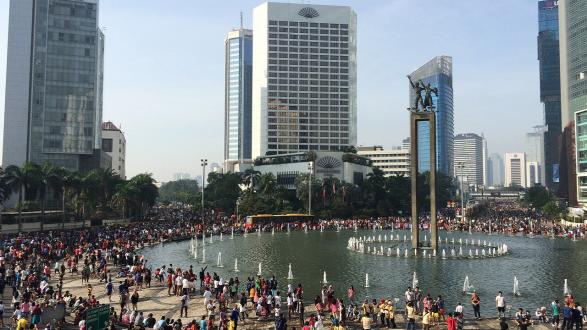In March, a Pacific Council delegation traveled to Jakarta and Yogyakarta, Indonesia. Indonesia is a strategically and economically important U.S. partner and regional actor: the country is proximate to the South China Sea, boasts Southeast Asia's biggest economy, and is both the world’s largest Muslim-majority population and the world’s third largest democracy.
Delegates used the visit to learn more about Indonesia, its current challenges and opportunities, U.S. priorities in the region, and the role of the Association of Southeast Asian Nations (ASEAN).
Several key points emerged from the visit.
____________________
1. Jakarta does not seek to balance the power of its neighbors.
One might expect Indonesia – a significant player in the region – to take sides in the South China Sea disputes. Dr. Rizal Sukma, Executive Director of the Centre for Strategic and International Studies in Jakarta, told Pacific Council delegates explicitly that Indonesian policy is just the opposite: Jakarta feels little need to participate in competitions between major powers, and its close relationship with Beijing is mostly a byproduct of economics. In the case of the South China Sea, the current administration looks to ASEAN as a trusted broker.
Jakarta nonetheless wants to see a peaceful resolution to the power struggle playing out in its region. Representatives at Indonesia’s Ministry of Defense noted that the country’s military abilities were significantly hampered by the U.S. embargo that lasted from 1999 to 2005. The ministers called upon
Washington to support Indonesia’s efforts to strengthen its military capacity in order to help promote to regional stability, lest the South China Sea conflict deepen and further destabilize the region.
Delegates also met with U.S. Ambassador to ASEAN Nina Hachigian – a long-time member of the Pacific Council. Ambassador Hachigian noted that Indonesia has always been a champion of ASEAN, responsible for the implementation of many of its initiatives. In her role she interacts regularly with the ambassadors of the ASEAN member states as well as others who – like the United States – have ASEAN observer status.
2. Indonesia may be “the freest country in Asia.”
Indonesia is remarkably diverse, comprised of thousands of islands where more than 300 local languages are spoken. The U.S. Ambassador to Indonesia, Robert O. Blake, called it “one of the freest countries in Asia,” and in a nation with half of the population under age 30, he pointed to those democratic values as a great opportunity.
Islam plays a fundamental role in the country’s social and political makeup, but the country is formally secular with no official state religion. Instead, Islam is interwoven with Indonesia’s local customs and culture, including that of other faiths, like Hinduism.
The former head of the Mohammediya (Indonesia’s second largest Islamic organization), Dr. Mohammad Amien Rais – known as Amien Rais – emphasized the multi-religious nature of the country in his meeting with the Pacific Council delegation, saying for example that Sharia law “will never ever” be imposed in Indonesia. He noted that all large Muslim organizations in the country – which represent nearly 97% of Indonesian Muslims – recognize the important role of secularism. Voters in Indonesia, interviewees reported, have very diverse political and social interests: indeed, many Islamic political parties are struggling to even stay engaged, and they often need to form coalitions with nationalist groups to get traction.
3. Southeast Asia’s largest economy remains vulnerable.
Indonesia’s economy is growing, but that growth will not be sustainable if the state does not address underlying weaknesses. Mr. Lukita Dinarsyah Tuwo, the Secretary General of the Coordinating Ministry for Economic Affairs, told Pacific Council delegates that the country needs to invest in infrastructure, reform the legal system, diversify beyond simple extraction of raw materials, and develop its vast untapped human capital.
Dr. Ir. Sutanto Soehodho underlined the infrastructure issue. Soehodho, who serves as Deputy Governor for Industry, Trade, and Transportation, noted that Jakarta adds some 300 automobiles and 1000 motorcycles to the roads each day. Two million people commute in and out of the city daily so that a three kilometer commute within the city can take drivers a full hour. The World Bank estimates that infrastructure issues – from gridlock traffic to electricity blackouts – have contributed to a 1 percent loss of economic growth per year.
Mr. Meidyatama Suryodiningrat, Editor in Chief of The Jakarta Post (Indonesia’s largest English-language newspaper), added another issue to the list: corruption. And as Mr. James Gilling – Acting Deputy Head of Mission for the Australian Embassy in Jakarta – pointed out, that corruption has wide-reaching effects beyond politics. The government in Jakarta employs a staggering 4 million people. Teaching jobs are well-paid, desirable positions that are sometimes purchased with bribes. The resulting absenteeism and poor teacher performance leads to education outcomes that are among the worst in the world.
4. President Widodo has some big challenges to tackle.
Elected last year, President Joko Widodo made a wide range of campaign promises, and Indonesians expect him to deliver. Ambassador Blake noted that many international investors have held back in recent months as they wait to see what Widodo will be able to do. In addition to ambitious infrastructure goals, the new president tasked Indonesia’s foreign missions with increasing trade by 300 percent in the next five years.
Mr. Abdurrahman Mohammad Fachir, Indonesia’s Deputy Foreign Minister, told Pacific Council delegates that in order to preserve regional stability Indonesia also needs a long-term solution for dealing with refugees. International support, he noted, should include assurances for resettling refugees that arrive on Indonesian shores.
President Widodo will need to post some wins, and quickly. The president’s approval rating tumbled to 42.29 percent in January, down from 75 percent when he entered office.
____________________
The Pacific Council delegation visited Jakarta and Yogyakarta, Indonesia, from March 25 to 29, 2015.




